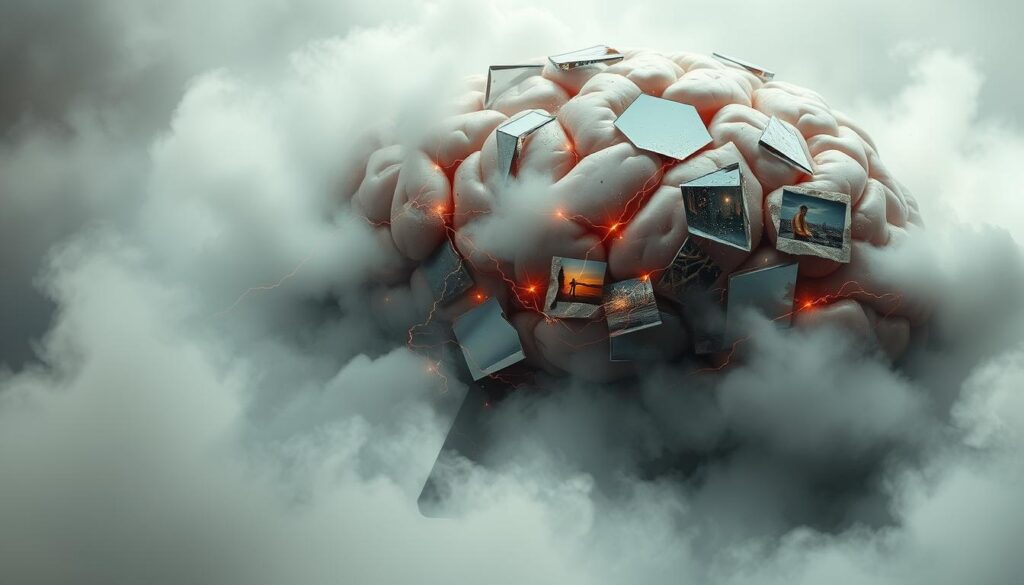How Epilepsy Can Affect Memory Loss

Epilepsy is more than just seizures. It can cause epilepsy memory loss that makes everyday tasks hard. People struggle to remember words, facts, and even their own experiences. This is because of the cognitive effects of epilepsy.
This condition shows a deep link between seizures and how well we think. Especially when it comes to memory impairment.
We need to understand this link. It helps in finding better ways to manage and treat the condition.
Memory issues can differ a lot from person to person. They depend on many factors related to their epilepsy type.
Knowing why memory loss happens in epilepsy is key. It opens the door to more effective treatments.
Table of Contents
Memory Impairment in Epilepsy
People with epilepsy often face big challenges with memory.
These problems affect their daily life. They struggle with both short-term and long-term memory, making it hard in work and personal life.
Studies show that some types of epilepsy, like temporal lobe epilepsy, make it hard to learn new things.
The seizures they have cause these memory issues.
On the other hand, frontal lobe epilepsy might make it tough to remember past events.
Knowing the type of epilepsy is key to understanding memory problems. Animal studies back up these findings. They show that seizures can really hurt memory.
Things like long-term potentiation and theta power get worse. This makes it hard to remember places and navigate.
For those with epilepsy, memory problems get worse over time. This is because they keep having seizures and their brain changes. Depression and anxiety can also make memory worse.
In short, helping people with epilepsy with their memory is very important.
Different things affect memory, so we need to find the right help. This can really improve their life.
How Seizures Influence Memory Loss
Seizures can greatly affect the brain’s memory-making abilities.
During these episodes, memory stops being stored, leading to temporary amnesia. This is especially true for people with different types of epilepsy.
Discover Your Path to a Longer, Healthier Life!
Take our free quiz to see how your lifestyle measures up to the world's longest-living communities and receive expert tips for a healthier, longer life.
Take the QuizStudies show that those with focal epilepsy struggle more with memory than healthy people.
Those with temporal lobe epilepsy often forget events right before a seizure.
The way seizures affect memory is complex, influenced by when they start and how often they happen.
People with epilepsy starting early in life might have worse memory.
This is because they are diagnosed and have more seizures. On the other hand, those with epilepsy starting later might have trouble remembering personal events.
This is linked to depression and brain damage seen on MRI scans.
Also, many with epilepsy show small memory problems on tests. But, their real challenge is remembering personal events. This shows how unique their memory issues are.
The following table summarizes key findings related to memory performance in epilepsy patients:
| Aspect | Findings |
|---|---|
| Focal Epilepsy | Worse performance on semantic and episodic memory measures |
| Early-Onset Epilepsy | Associations with frequent seizures and reduced working memory |
| Late-Onset Epilepsy | Memory issues linked to depression and MRI lesions |
| Temporal Lobe Epilepsy | Experiences retrograde amnesia surrounding seizures |
| Depressive Symptoms | High prevalence in epilepsy patients correlating with memory impairments |
Seizures not only disrupt memory but also affect how memories are consolidated.
The brain’s memory circuits can be severely impacted.
Research now points to the need to study more brain areas to understand memory loss caused by seizures.
Factors Affecting Memory in Epilepsy Patients
Many things can affect memory in people with epilepsy. These can be divided into fixed and non-fixed factors.
Fixed factors, like a brain injury, can increase the risk of dementia.
On the other hand, non-fixed factors include how well seizures are managed, stress, substance use, and not getting enough sleep.
Mood also plays a big role in memory for those with epilepsy.
Conditions like anxiety and depression can really mess with memory.
Stress can make these mood effects worse, making it harder to remember things or recall events.
It’s important to take care of mental health to improve memory and thinking skills.
Getting enough sleep is also key for memory in epilepsy patients.
Not getting enough rest can make memory problems worse.
Understanding how sleep and epilepsy are connected can help improve memory and thinking for patients.
In summary, memory loss in epilepsy patients is influenced by many factors.
By focusing on both fixed and non-fixed factors, including mood and sleep, doctors can help improve memory and thinking.
Recognizing these factors is crucial for creating effective treatments and support plans.
| Factor Type | Examples | Impact on Memory |
|---|---|---|
| Fixed Factors | Prior brain injury | Increased risk of memory deficits |
| Non-Fixed Factors | Poor seizure management, high stress levels, substance use | Potential cognitive decline |
| Mood Effects | Anxiety, depression | Disruption of memory processes |
| Sleep Quality | Insufficient sleep | Exacerbation of memory problems |
The Impact of Anti-Seizure Medications on Memory
Anti-seizure medications are key in managing epilepsy.
But, they can also affect memory and other brain functions. Side effects like drowsiness and trouble focusing make it hard to learn new things. This can lead to serious memory issues.
How well these drugs work can vary a lot.
Things like the dose and what other drugs are taken can play a big role. Taking too much can make it harder to think clearly and remember things.
Some drugs are worse than others for memory.
For example, phenobarbital can lower IQ in kids with epilepsy.
Stopping it can help their thinking skills get better. On the other hand, carbamazepine can hurt memory and how well you can speak.
Here’s a table showing how different anti-seizure drugs affect the brain:
| Medication | Cognitive Effects |
|---|---|
| Phenobarbital | Lower IQ, attentional difficulties |
| Carbamazepine | Poor verbal fluency, memory impairments |
| Primidone | Adverse effects on motor performance and concentration |
| Phenytoin | Declines in concentration, memory, visuomotor functions |
| Levetiracetam | Potential cognitive improvement in patients with silent epileptic activity |
Talking openly with doctors is important to tackle memory issues caused by drugs.
Lifespan Comparison Tool
Compare the life expectancy by the U.S. State
Changing medications or doses can greatly improve memory and life quality.
Diagnosis of Epilepsy-Related Memory Issues
Diagnosing epilepsy-related memory issues starts with a detailed check-up by a doctor or neurologist.
They use various tools to get a clear picture of the problem.
Some common methods include:
- Neuropsychological tests: These tests check memory, attention, and language skills.
- Brain imaging: MRI or CT scans show brain changes that might cause memory problems.
- Electroencephalogram (EEG) readings: This test records brain activity, helping spot seizures.
- Blood tests: These tests check for infections or metabolic disorders that could affect memory.
Understanding how epilepsy affects memory can be tricky.
Different seizures impact the brain in different ways. For example, seizures in the temporal and frontal lobes can lead to memory problems.
People might find it hard to remember things short-term or long-term.
They might also have trouble paying attention or doing several things at once.
Other factors like poor seizure control, not enough sleep, and high stress can also cause memory issues.
Some medicines for seizures can make memory problems worse. So, it’s important to look at these factors for treatment.
In short, diagnosing epilepsy-related memory issues needs a detailed approach.
It involves memory tests, neurological exams, and looking at the person’s medical history and lifestyle.
Conclusion
Epilepsy can deeply affect memory loss, making it crucial to manage both seizures and brain health.
Talking openly with doctors is key for those facing these challenges.
Trying different treatments, making lifestyle changes, and cognitive therapy can improve life quality.
Research is also key to understanding how epilepsy impacts the brain.
This knowledge helps create better treatments for brain function.
Early diagnosis and personalized treatment plans can help manage epilepsy’s effects on memory.
By focusing on controlling seizures and improving brain function, people with epilepsy can lead more balanced lives.
This approach ensures that memory issues don’t dominate their lives.

 972-393-1699
972-393-1699







